Unit 4 Growing up Period 1课件(共27张PPT)牛津译林版九年级上册
文档属性
| 名称 | Unit 4 Growing up Period 1课件(共27张PPT)牛津译林版九年级上册 |  | |
| 格式 | pptx | ||
| 文件大小 | 1.7MB | ||
| 资源类型 | 教案 | ||
| 版本资源 | 牛津译林版 | ||
| 科目 | 英语 | ||
| 更新时间 | 2024-10-20 12:13:17 | ||
图片预览

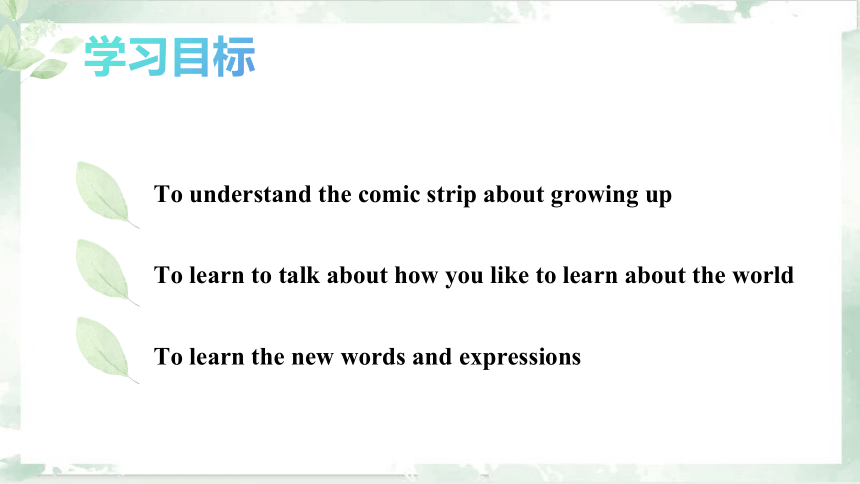
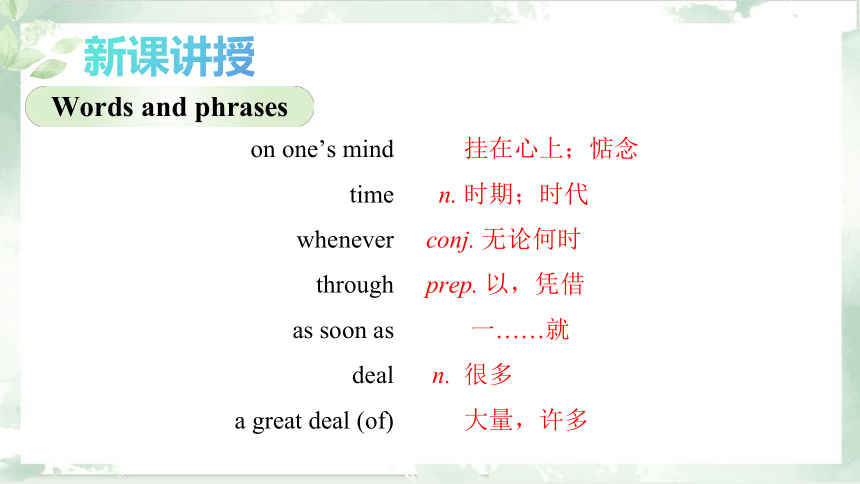
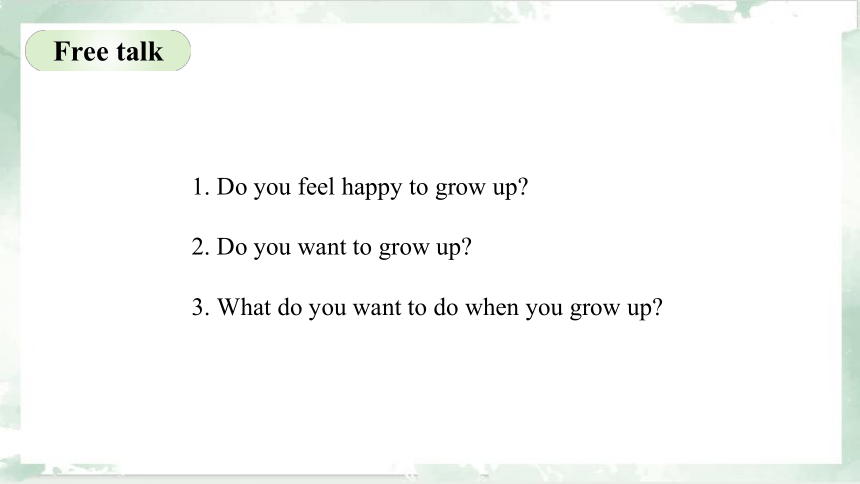
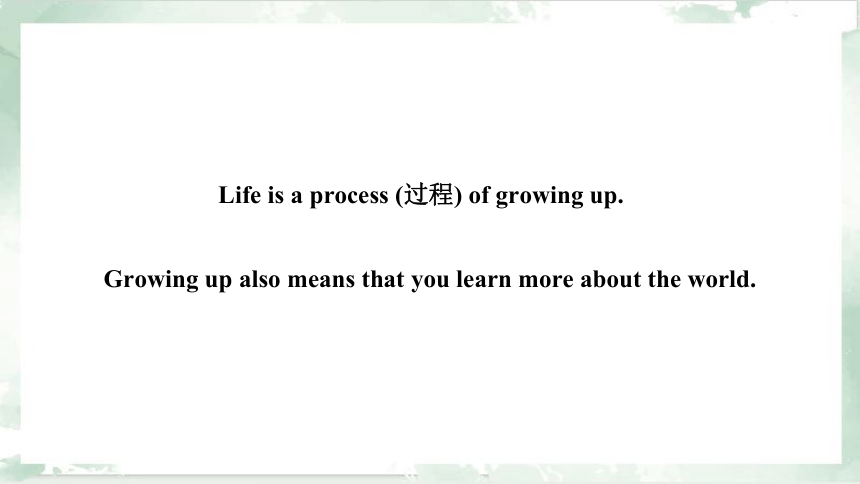
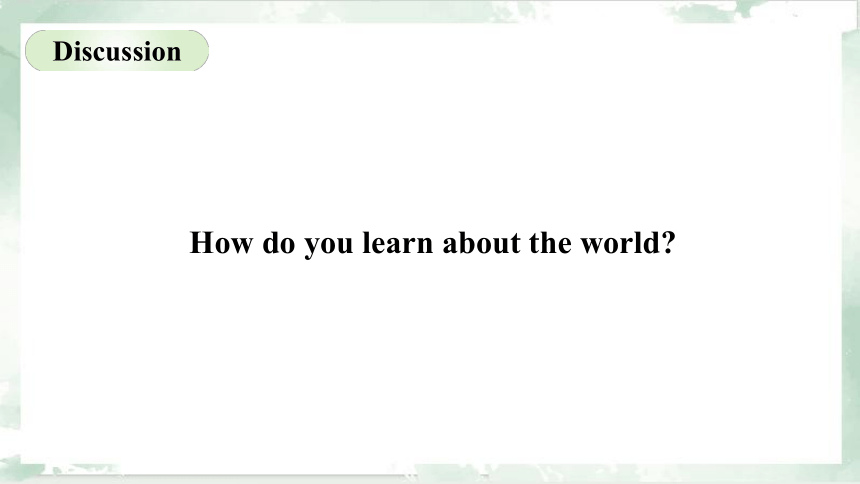

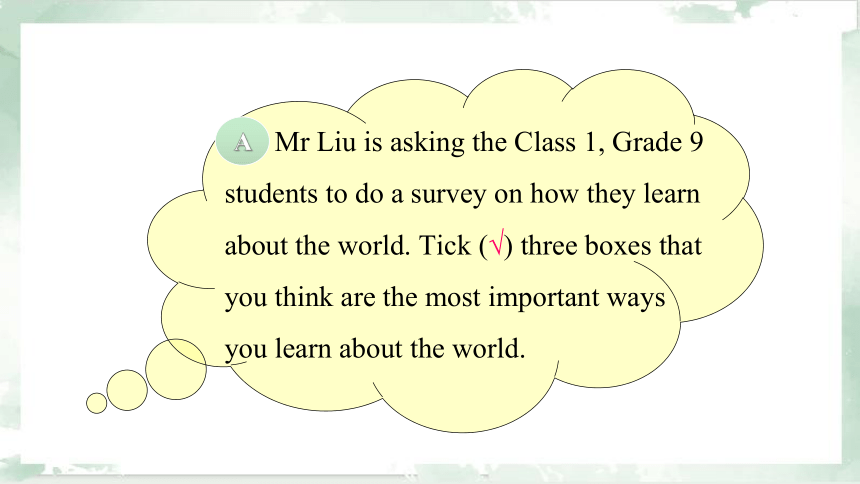
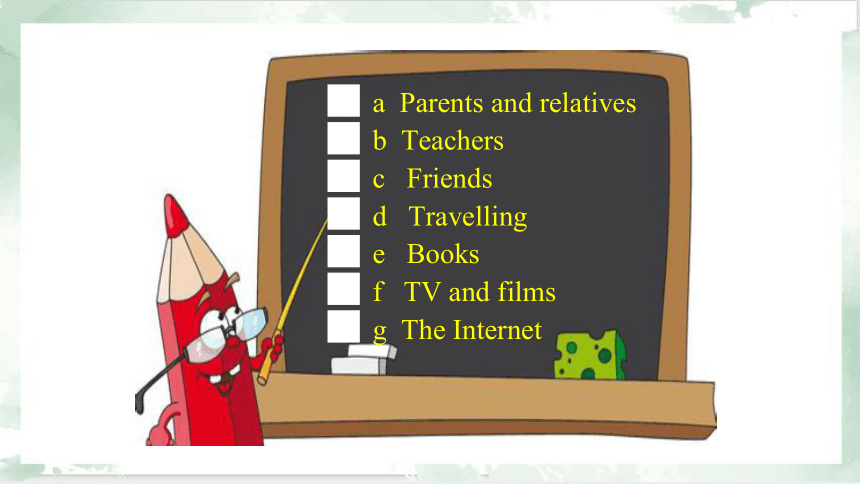
文档简介
(共27张PPT)
Comic strip & Welcome to the unit
Unit 4
Growing up
To understand the comic strip about growing up
To learn to talk about how you like to learn about the world
To learn the new words and expressions
学习目标
on one’s mind
time
whenever
through
as soon as
deal
a great deal (of)
挂在心上;惦念
n. 时期;时代
conj. 无论何时
prep. 以,凭借
一……就
n. 很多
大量,许多
Words and phrases
新课讲授
1. Do you feel happy to grow up
2. Do you want to grow up
3. What do you want to do when you grow up
Free talk
Life is a process (过程) of growing up.
Growing up also means that you learn more about the world.
How do you learn about the world
Discussion
how to learn
about the
world
parents and
relatives
teachers
friends
travelling
books
TV and films
the Internet
Brainstorm
Mr Liu is asking the Class 1, Grade 9 students to do a survey on how they learn about the world. Tick (√) three boxes that you think are the most important ways you learn about the world.
A
a Parents and relatives
b Teachers
c Friends
d Travelling
e Books
f TV and films
g The Internet
We can learn about the world through many ways, such as parents and relatives, teachers, friends, travelling, books, TV and films and the Internet. To my classmates, ________, _________ and _______ are the most important ways to learn about the world.
Make a report about your answers as following:
Simon and Millie are talking about how they like to learn about the world. Read the conversation and fill in the blanks.
B
Name How does he/ she learn about the world Why does he/she like to learn that way
Millie
Simon
It’s quick. As soon as he clicks the mouse, there’s a great deal of information.
Books allow her to learn about people in different times and places, and she can read them whenever she wants to.
through the Internet
from books
Work in pairs and talk about your ideas. Use the conversation as a model.
A: How do you learn about the world
B: I’d like to learn about the world…
A: Why do you like to learn that way
B: … What about you
A: I like to learn about the world …
B: Why
A: …
Talk
Discuss and fill in the blanks below.
Ways to learn about the world Possible Reasons
Parents and relatives
Teachers
Friends
Travelling
Books
TV and films
The Internet
tell their own experiences
give much knowledge
share everything with each other
know something about other places
learn about people in different times and places
get information quickly
get vivid(生动的) information
Discussion
Listen to the conversation between Eddie and Hobo and answer the following questions.
1. Why is Eddie worried
2. What does Hobo advise Eddie to do
3. What does Eddie want Hobo to do
Because he thinks he is growing too big for his house now.
Hobo advises Eddie to build another house for himself.
Eddie wants Hobo to build a house for him.
Questions
1.What’s on your mind, Eddie
mind (n) 头脑、思想 (v)介意
(1)挂在心上,惦念
(2)在某人的脑海里
(3)对某人的身心有益
(4)改变某人的主意
(5)下定决心做某事
(6)记住
(7)介意(某人)做某事
(8)不要紧,没关系
eg.There must be something ___________.他定有什么心思。
eg.—Do you mind my taking this seat —_______.It's for Mr Smith.
A.Not at all B.Yes, please
C.Of course not D.You'd better not
on his mind
D
on one’s mind
in one’s mind
be good for one’s mind and body
change one’s mind
make up one’s mind to do sth.
keep ……in mind =remember...
mind (one’s/sb.) doing sth.
never mind
Language points
2. What’s up 怎么啦?
=What’s wrong = What’s the matter/trouble
What's up with .... ...怎么啦?
eg.西蒙,怎么了?你看起来不太好。
What's up, Simon You look bad.
eg.苏珊,你的脸怎么了?
What's up with your face, Susan
3.Build another one for yourself. 为你自己再建造一个。
build (v)建造 build-built-built building (n)大楼
build sb. sth.=build sth. for sb.
eg.用小棍搭个帐篷。 Build a camp out of sticks.
4.Don’t wake me up until you finish building it.
finish 用法:finish (v) 完成 finish/complete (doing) sth.
finished (adj) 完成的 sth. be finished
eg.His father finished ________(fix) the broken machine.
eg. The work is _________(finish). Let's have a rest.
until 用法
(1). 用于肯定句中,主句的动词只能用延续性的。
我将在这儿等着你,直到你回来为止。
I’ll wait for you here until/till you come back.
(2). 用于否定句时,主句的谓语动词是非延续性的。not….until / till 意为“直到…才”
eg.直到他来我们才离开。
We ______________ until she came here.
eg.—_______ will the meeting begin —______seven a.m.
A.How long, Not until B.How long, Until
C.How soon, Not until D.How soon, Until
完整:The meeting did not begin until 7 a.m.
fixing
finished
didn't leave
C
5.time (cn) 时代、时期、倍数、次数
(un)时间
短语:在古代/在现代
在不同时代
A是B的几倍大
A比B大几倍
有时间做某事
在我的空闲时间
某人做某事很高兴!
eg.随着时代的发展,这个手机过时了。
in ancient/modern times
in different times
A is 倍数 as big as B
A is 倍数 bigger than B
have time to do sth./for sth.
in my free/spare time
What a wonderful time sb. has doing sth.!
=What fun sb. has doing sth.!
With the development of the times, the phone is out of date.
time 词组归纳
同时:
准时:
及时:
一直:
业余时间:
第一次:
立刻:
一次:
跳舞一段时间:
某个时间:
几次:
偶尔:
at the same time
on time
in time
all the time= always= at all times
spare/free time
for the first time
in no time=at once=right away
at a time
dance for some time
sometime
some times
from time to time=at times=sometimes
6.… and I can read them whenever I want to.
whenever意为在任何时候;无论何时;每当。作连词引导状语从句, 相当于no matter when或every time。类似的词还有whatever (无论什么), wherever (无论哪里),
whoever(无论谁),however(无论如何)等。
eg.每当我遇到困难,我的老师总是鼓励我。
Whenever I meet difficulties, my teacher always encourages me.
eg.无论你说什么,我都相信你。
___________ you say, I’ll believe you.
eg.不管是谁打电话,都说我出去了。
________ telephones, tell them I’m out.
只要有可能,他就去看她。
Whenever (it is) possible, he goes to see her.
Whatever
Whoever
7.through (prep) 以、凭借 后接名词或代词
(prep) 穿过
穿过
浏览
通过辛苦工作/通过网络
eg.幸福来自辛苦工作。
Happiness is achieved through hard work.
eg.交作业前你最好仔细检查.
You'd better look through your work before handing it in.
eg.—It's said that people can get relaxed ____ exercise.
—I see. But you should keep away _____ dangerous sports.
A.with, from B.for, off
C.through, from D.through, by
C
through the city/ the tunnel/ the clouds/ the forest/the door/the window/ the hole
look through
through hard work/the Internet
8.As soon as you click the mouse, there’s a great deal of information.
(1) as soon as 一……就,引导时间状语从句。主句是一般将来时,则从句常用一般现在时,主句过去时,从句也用过去时。
eg.我一到家,就给你打电话。
I will call you as soon as I get home.
eg.他一坐下,就拿出英语书。
He took out his English book as soon as he sat down.
(2)as ...as possible/sb. can 尽可能...
eg. 他游的尽可能远。
He swam as far as he could/possible.
9.a great/good deal of 许多 修饰不可数名词
a great/good deal 修饰动词、形容词或副词比较级。
eg.他们花了许多钱。
They spent a great deal of money.
eg.去年12月雪下得很大。
It snowed a great deal/hard/heavily last December.
eg.他比Tom跑快得多。
He ran a great deal faster than Tom.
拓展:许多的词组
plenty of 后接可数或不可数名词
a lot of/lots of 后接可数或不可数名词
a number of 后接可数名词
根据句意,用所给单词的适当形式填空
1. ___________ (when) his mother gets up, she always gets ready for her children.
2. Never think only about ____________ (you), children.
3. Reading books can help us learn a lot about people in different _______ (time).
4. She has told her friends and ________ (relative) about it.
5. Newton was sitting under an apple tree when an apple ______ (fall) onto his head.
6. Don’t go out to play football until you finish ________ (draw) the picture.
7. Betty ___________ (call) us as soon as her mother arrives at the airport.
8.Helen is going to talk with you as soon as she ________ (finish) her work.
Whenever
yourselves
times
relatives
fell
drawing
will call
finishes
当堂检测
根据汉语及提示翻译下列句子。
1. 萨拉,你看起来很焦虑。有什么事吗?(on one’s mind)
You _____________. Is there anything _____________
2. 我一见到他就告诉他。(as soon as)
I ________ him about it ___________ I see him.
3. 出现了很多坏新闻。(a great deal of)
There has been _____________________.
4. 凭借因特网,人们能够获取大量信息。
People can get ___________________________________the Internet.
5. 有些人直到失去健康才意识到健康的重要性。
Some people won’t realize the importance of their health _______________.
look worried on your mind
will tell as soon as
a great deal of bad news
a great deal of information through
until they lose it
Comic strip & Welcome to the unit
Unit 4
Growing up
To understand the comic strip about growing up
To learn to talk about how you like to learn about the world
To learn the new words and expressions
学习目标
on one’s mind
time
whenever
through
as soon as
deal
a great deal (of)
挂在心上;惦念
n. 时期;时代
conj. 无论何时
prep. 以,凭借
一……就
n. 很多
大量,许多
Words and phrases
新课讲授
1. Do you feel happy to grow up
2. Do you want to grow up
3. What do you want to do when you grow up
Free talk
Life is a process (过程) of growing up.
Growing up also means that you learn more about the world.
How do you learn about the world
Discussion
how to learn
about the
world
parents and
relatives
teachers
friends
travelling
books
TV and films
the Internet
Brainstorm
Mr Liu is asking the Class 1, Grade 9 students to do a survey on how they learn about the world. Tick (√) three boxes that you think are the most important ways you learn about the world.
A
a Parents and relatives
b Teachers
c Friends
d Travelling
e Books
f TV and films
g The Internet
We can learn about the world through many ways, such as parents and relatives, teachers, friends, travelling, books, TV and films and the Internet. To my classmates, ________, _________ and _______ are the most important ways to learn about the world.
Make a report about your answers as following:
Simon and Millie are talking about how they like to learn about the world. Read the conversation and fill in the blanks.
B
Name How does he/ she learn about the world Why does he/she like to learn that way
Millie
Simon
It’s quick. As soon as he clicks the mouse, there’s a great deal of information.
Books allow her to learn about people in different times and places, and she can read them whenever she wants to.
through the Internet
from books
Work in pairs and talk about your ideas. Use the conversation as a model.
A: How do you learn about the world
B: I’d like to learn about the world…
A: Why do you like to learn that way
B: … What about you
A: I like to learn about the world …
B: Why
A: …
Talk
Discuss and fill in the blanks below.
Ways to learn about the world Possible Reasons
Parents and relatives
Teachers
Friends
Travelling
Books
TV and films
The Internet
tell their own experiences
give much knowledge
share everything with each other
know something about other places
learn about people in different times and places
get information quickly
get vivid(生动的) information
Discussion
Listen to the conversation between Eddie and Hobo and answer the following questions.
1. Why is Eddie worried
2. What does Hobo advise Eddie to do
3. What does Eddie want Hobo to do
Because he thinks he is growing too big for his house now.
Hobo advises Eddie to build another house for himself.
Eddie wants Hobo to build a house for him.
Questions
1.What’s on your mind, Eddie
mind (n) 头脑、思想 (v)介意
(1)挂在心上,惦念
(2)在某人的脑海里
(3)对某人的身心有益
(4)改变某人的主意
(5)下定决心做某事
(6)记住
(7)介意(某人)做某事
(8)不要紧,没关系
eg.There must be something ___________.他定有什么心思。
eg.—Do you mind my taking this seat —_______.It's for Mr Smith.
A.Not at all B.Yes, please
C.Of course not D.You'd better not
on his mind
D
on one’s mind
in one’s mind
be good for one’s mind and body
change one’s mind
make up one’s mind to do sth.
keep ……in mind =remember...
mind (one’s/sb.) doing sth.
never mind
Language points
2. What’s up 怎么啦?
=What’s wrong = What’s the matter/trouble
What's up with .... ...怎么啦?
eg.西蒙,怎么了?你看起来不太好。
What's up, Simon You look bad.
eg.苏珊,你的脸怎么了?
What's up with your face, Susan
3.Build another one for yourself. 为你自己再建造一个。
build (v)建造 build-built-built building (n)大楼
build sb. sth.=build sth. for sb.
eg.用小棍搭个帐篷。 Build a camp out of sticks.
4.Don’t wake me up until you finish building it.
finish 用法:finish (v) 完成 finish/complete (doing) sth.
finished (adj) 完成的 sth. be finished
eg.His father finished ________(fix) the broken machine.
eg. The work is _________(finish). Let's have a rest.
until 用法
(1). 用于肯定句中,主句的动词只能用延续性的。
我将在这儿等着你,直到你回来为止。
I’ll wait for you here until/till you come back.
(2). 用于否定句时,主句的谓语动词是非延续性的。not….until / till 意为“直到…才”
eg.直到他来我们才离开。
We ______________ until she came here.
eg.—_______ will the meeting begin —______seven a.m.
A.How long, Not until B.How long, Until
C.How soon, Not until D.How soon, Until
完整:The meeting did not begin until 7 a.m.
fixing
finished
didn't leave
C
5.time (cn) 时代、时期、倍数、次数
(un)时间
短语:在古代/在现代
在不同时代
A是B的几倍大
A比B大几倍
有时间做某事
在我的空闲时间
某人做某事很高兴!
eg.随着时代的发展,这个手机过时了。
in ancient/modern times
in different times
A is 倍数 as big as B
A is 倍数 bigger than B
have time to do sth./for sth.
in my free/spare time
What a wonderful time sb. has doing sth.!
=What fun sb. has doing sth.!
With the development of the times, the phone is out of date.
time 词组归纳
同时:
准时:
及时:
一直:
业余时间:
第一次:
立刻:
一次:
跳舞一段时间:
某个时间:
几次:
偶尔:
at the same time
on time
in time
all the time= always= at all times
spare/free time
for the first time
in no time=at once=right away
at a time
dance for some time
sometime
some times
from time to time=at times=sometimes
6.… and I can read them whenever I want to.
whenever意为在任何时候;无论何时;每当。作连词引导状语从句, 相当于no matter when或every time。类似的词还有whatever (无论什么), wherever (无论哪里),
whoever(无论谁),however(无论如何)等。
eg.每当我遇到困难,我的老师总是鼓励我。
Whenever I meet difficulties, my teacher always encourages me.
eg.无论你说什么,我都相信你。
___________ you say, I’ll believe you.
eg.不管是谁打电话,都说我出去了。
________ telephones, tell them I’m out.
只要有可能,他就去看她。
Whenever (it is) possible, he goes to see her.
Whatever
Whoever
7.through (prep) 以、凭借 后接名词或代词
(prep) 穿过
穿过
浏览
通过辛苦工作/通过网络
eg.幸福来自辛苦工作。
Happiness is achieved through hard work.
eg.交作业前你最好仔细检查.
You'd better look through your work before handing it in.
eg.—It's said that people can get relaxed ____ exercise.
—I see. But you should keep away _____ dangerous sports.
A.with, from B.for, off
C.through, from D.through, by
C
through the city/ the tunnel/ the clouds/ the forest/the door/the window/ the hole
look through
through hard work/the Internet
8.As soon as you click the mouse, there’s a great deal of information.
(1) as soon as 一……就,引导时间状语从句。主句是一般将来时,则从句常用一般现在时,主句过去时,从句也用过去时。
eg.我一到家,就给你打电话。
I will call you as soon as I get home.
eg.他一坐下,就拿出英语书。
He took out his English book as soon as he sat down.
(2)as ...as possible/sb. can 尽可能...
eg. 他游的尽可能远。
He swam as far as he could/possible.
9.a great/good deal of 许多 修饰不可数名词
a great/good deal 修饰动词、形容词或副词比较级。
eg.他们花了许多钱。
They spent a great deal of money.
eg.去年12月雪下得很大。
It snowed a great deal/hard/heavily last December.
eg.他比Tom跑快得多。
He ran a great deal faster than Tom.
拓展:许多的词组
plenty of 后接可数或不可数名词
a lot of/lots of 后接可数或不可数名词
a number of 后接可数名词
根据句意,用所给单词的适当形式填空
1. ___________ (when) his mother gets up, she always gets ready for her children.
2. Never think only about ____________ (you), children.
3. Reading books can help us learn a lot about people in different _______ (time).
4. She has told her friends and ________ (relative) about it.
5. Newton was sitting under an apple tree when an apple ______ (fall) onto his head.
6. Don’t go out to play football until you finish ________ (draw) the picture.
7. Betty ___________ (call) us as soon as her mother arrives at the airport.
8.Helen is going to talk with you as soon as she ________ (finish) her work.
Whenever
yourselves
times
relatives
fell
drawing
will call
finishes
当堂检测
根据汉语及提示翻译下列句子。
1. 萨拉,你看起来很焦虑。有什么事吗?(on one’s mind)
You _____________. Is there anything _____________
2. 我一见到他就告诉他。(as soon as)
I ________ him about it ___________ I see him.
3. 出现了很多坏新闻。(a great deal of)
There has been _____________________.
4. 凭借因特网,人们能够获取大量信息。
People can get ___________________________________the Internet.
5. 有些人直到失去健康才意识到健康的重要性。
Some people won’t realize the importance of their health _______________.
look worried on your mind
will tell as soon as
a great deal of bad news
a great deal of information through
until they lose it
